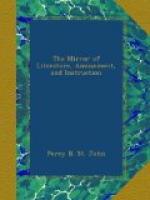The person of the King, says Walpole, is as perfect in my memory as if I saw him but yesterday: it was that of an elderly man, rather pale, and exactly like his pictures and coins; not tall, of an aspect rather good than august, with a dark tie wig, a plain coat, waistcoat and breeches, of snuff-coloured cloth, with stockings of the same colour, and a blue riband over all.
He often dined, after shooting, at Sir Robert Walpole’s house on Richmond Hill; where he indulged his partiality for punch to such an extent, that the Duchess of Kendal enjoined the Germans who usually accompanied him, to restrain him from drinking too much: but they went about their task with so little address, that the King took offence, and silenced them by the coarsest epithets in their mother tongue.
He appears to have entertained a very low opinion of the political integrity of his courtiers, and the honesty of his household. He laughed at the complaints made by Sir Robert Walpole against the Hanoverians, for selling places; and would not believe that the custom was not sanctioned by his English advisers and attendants. Soon after his first arrival in this country, a favourite cook, whom he had brought from Hanover grew melancholy, and wanted to return home. The King having inquired why he wanted to quit his household, the fellow replied, “I have long served your Majesty honestly, not suffering any thing to be embezzled in your kitchen; but here, the dishes no sooner come from your table, than one steals a fowl, another a pig, a third a joint of meat, a fourth a pie, and so on, till the whole is gone; and I cannot bear to see your Majesty so injured!” The King, laughing heartily, said, “My revenues here enable me to bear these things; and, to reconcile you to your place, do you steal like the rest, and mind you take enough.” The cook followed this advice, and soon became a very expert thief.
Toland says, in a pamphlet published about the year 1705, I need give no more particular proof of the King’s frugality in laying out the public money, than that all the expenses of his court, as to eating, drinking, fire, candles, and the like, are duly paid every Saturday night; the officers of his army receive their pay every month, and all the civil list are cleared every half year. He was greatly annoyed by the want of confidence in his economy, displayed by his British subjects; lamenting to his private friends that he had left his electorate to become a begging King; and adding, that he thought it very hard to be constantly opposed in his application for supplies, which it was his intention to employ for the benefit of the nation.
The account of the death of George the First was first brought to Walpole, in a dispatch from Townshend, who had accompanied that monarch to the continent. The minister instantly repaired to the palace at Richmond. The new King had then retired to take his usual afternoon nap. On being informed that his father was dead, he could scarcely be brought to put faith in the intelligence, until told that the minister was waiting in the ante-chamber with Lord Townshend’s despatch. At length, he received Walpole, who, kneeling, kissed his hand, and inquired whom he would please to appoint to draw up the address to the Privy Council. “Sir Spencer Compton,” replied the King, an answer which signified Sir Robert’s dismissal.




